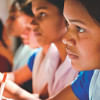A golden opportunity for gender inclusivity

Bangladesh is experiencing a profound moment of change, with the anti-discrimination movement, a new interim government, and accelerating climate change. Our nation is poised to enter a new era. A golden opportunity for reform in law and order, justice, government accountability, engaged and civically minded communities, and an equitable society for both women and men, has emerged.
We call on the new government to eliminate gender-based violence and advance the status of women and girls to encourage equitable economic development for people of all genders.
Although the former government signed onto international agreements such as the Convention on the Elimination of All Forms of Discrimination Against Women, it held reservation on Articles 2 and 16.1c, which articulates a commitment to eliminating institutionalised sexism and inequitable spousal rights in marital relations. The female population in Bangladesh is suffering, approximately 51 percent of females are married before the age of 18 and over half of them have experienced physical and/or sexual violence. This is a horrifying violation of their right to safety, mental well-being, and bodily autonomy.
Despite the powerful role of women and girls in the anti-discrimination movement, a majority of youth in leadership roles have been male. This is consistent with the patriarchal composition of government structures. While the interim government has consulted with a coalition of feminist civil society groups and leaders, it remains to be seen how the men in positions of authority will act. It's time for men to become agents of change and lift up their sisters, mothers, daughters, and wives.
Now is a moment for the people's power. We must advocate for change—a future where people from all walks of life live in an inclusive, democratic, and equitable society.
As communities across the nation grapple to address the deep challenges of past decades—high unemployment rates, rapidly escalating climate change vulnerability, and economic inequity—it will be all too easy to fall into old patterns and traps. Creating a better, more equitable future requires action by government, religious leaders and other influential social actors, as well as organisations providing social services. Women and girls need us to unify and voice our demands loud and clear.
A brighter future for Bangladesh depends on: i) a government that will allocate specific gender-centred budgets to support programmes that advance the wellbeing of women and girls, regardless of background; ii) empowered, engaged civil society and community groups working in complement to government services; iii) climate adaptation solutions that recognise the disproportionate impacts of climate change on women and girls, build resilient health and social systems, and increase women's autonomy over household food supplies, and planning and crisis management strategies; iv) transparent, honest collection, analysis, and use of data on patterns and changes in rates of gender-based discrimination, violence, and participation in leadership and governance; v) a no-exceptions refusal to condone or ignore violence against women and girls—this shift is unlikely to occur without women in leadership and authority positions. Equally, women in positions of authority must have adequate knowledge and agency and embrace the possibility of a world without gender-based violence; vi) opportunities and support for men and boys to learn new ways of handling stress, uncertainty, and crisis without projecting violence onto those around them; and vii) a paradigm shift in how work is valued, rewarded, and recognised. Not all work can be paid, but unpaid work must be valued by society. Men and women should share a mix of paid and unpaid work.
Bangladesh needs a future where all people can exercise their rights, and have the respect, support, and resources they need to enable a thriving, sustainable society and ecosystem. We must stop leaving women and girls behind. Instead, we must utilise their potential to be a force for positive evolution and innovation.
Dr Shamima Parveen is gender and advocacy manager, Pathfinder International, Bangladesh. She can be reached [email protected]
Sohanur Rahman is executive coordinator, YouthNet Global. He can be reached at [email protected]
Views expressed in this article are the authors' own.
Follow The Daily Star Opinion on Facebook for the latest opinions, commentaries and analyses by experts and professionals. To contribute your article or letter to The Daily Star Opinion, see our guidelines for submission.

 For all latest news, follow The Daily Star's Google News channel.
For all latest news, follow The Daily Star's Google News channel. 










Comments